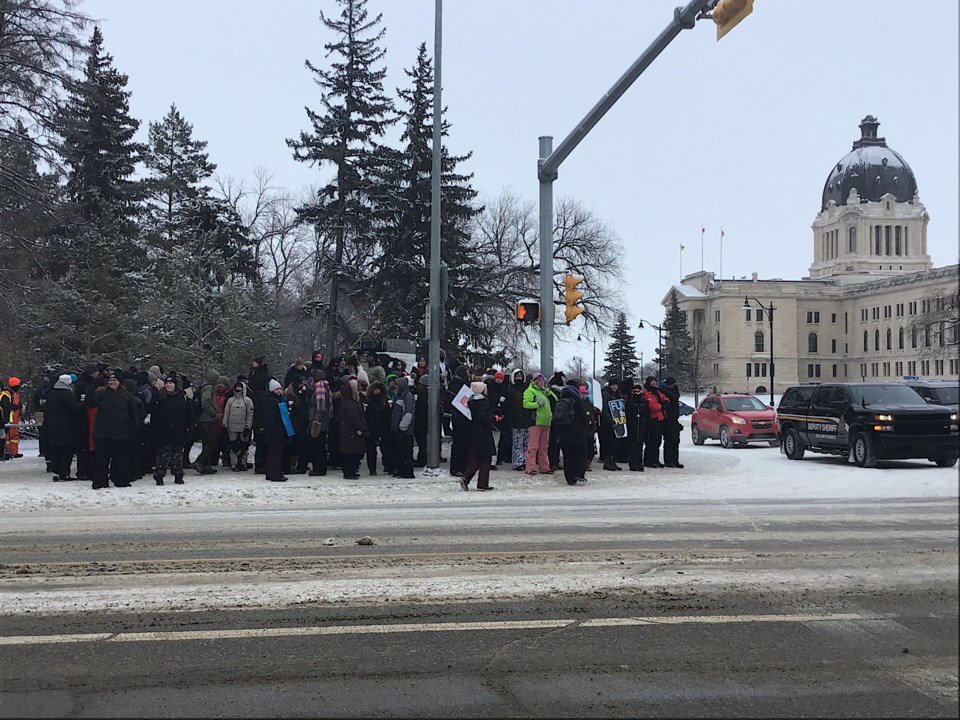SASKATOON – Talks have broken down in the labour dispute between Saskatchewan Teachers' Federation and the province.
STF sent out a statement this evening stating that the Teachers’ Bargaining Committee and Government-Trustee Bargaining Committee had been scheduled to resume negotiations at 5:30 p.m. today. However, they report that the government had advised they would not be returning to continue negotiations.
As such, an impasse has been declared again and sanctions will be reinstated starting Friday, Feb. 16, according to the union.
There had been two days set aside for the resumption of talks this week, but the indication from the teachers' union is that the talks went south quickly.
“The Government-Trustee Bargaining Committee promised a renewed mandate when it came back to the bargaining table, but it was readily apparent that the mandate was extremely limited," said STF President Samantha Becotte in a news release.
"They immediately began stalling tactics that undermined good faith negotiations. Instead of beginning Monday morning, the GTBC delayed until Monday afternoon, then pushed Tuesday’s start to 5:30 p.m., before eventually cancelling altogether. The GTBC promised a renewed mandate when it came back to the bargaining table, but it is unable to negotiate without directly consulting the Minister of Education."
The STF news release states the province has since been in direct contact with STF on a proposal that would occur outside of the bargaining process, but STF responded that all discussions must take place within the negotiation process. "As Minister Cockrill has stated, and the STF agrees, the best deals are made at the table," the news release states.
It appears classroom complexity, an issue that the province has stated repeatedly they will not negotiate on in collective bargaining, may have been a stumbling block leading to this latest breakdown in talks.
“Although government now openly acknowledges that there are complexity concerns in schools, it refuses to make long-term commitments where it can be held accountable," Becotte states. "Several other provinces – Ontario, New Brunswick, Prince Edward Island, Quebec and B.C. – have language around class size and complexity in their collective agreements with teachers. This government has already included patient complexity and an innovation fund as part of its new agreement with the province’s doctors. Government has shown it can and will address these matters in contracts when it chooses."
STF states in its release that it is willing to resume negotiations as soon as GTBC has a "legitimate mandate to negotiate on all items."
As for what to expect on Friday, in addition to the job action planned for that day, families can expect sanctions to resume following February break. The union maintains the job action will continue "until government gives its bargaining committee the tools and authority needed to honestly engage on teachers’ issues and make progress toward a tentative agreement," according to the news release.
The plan is for rotating strikes to resume Friday including demonstration sites across the street from Minister Cockrill’s office in North Battleford and Premier Moe’s office in Shellbrook from 10 a.m. to 2 p.m. on Friday. The following divisions will be impacted by the rotating strike:
• Prince Albert and Area Teachers’ Association
o Saskatchewan Rivers School Division
o Prince Albert Catholic School Division
• Tri-West Teachers’ Association
o Living Sky School Division
o Light of Christ School Division
o Sakewew High School (North Battleford)
• Association locale des enseignantes et enseignants fransaskois (Conseil des écoles fransaskoises)
o École St Isidore De Bellevue (Prince Albert)
o École Valois (Prince Albert)
o École Père Mercure (North Battleford)
• Saskatchewan Distance Learning Corporation
o North Central Campus (Prince Albert)
Also happening Friday will be provincewide withdrawal of noon hour supervision.
The indication from the government is that Education Minister Jeremy Cockrill will speak to reporters Wednesday morning at the legislature to respond to the latest developments.






